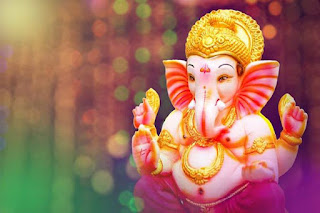Long-drawn celebrations are a part of the social and cultural
stuff of India. Amongst many religious and social cultures that mark the
diverse festive calendar of Indians, is a very significant religious occasion –
Ganesha Chaturthi is about the birth of the Elephant-headed god, Ganesha. It is
celebrated with much excitement especially in the states of Maharashtra, Tamil
Nadu, Andhra Pradesh, and Karnataka.
Ganesha Chaturthi in most places in India is a
day to entreat Ganesha, the god of wisdom, prosperity and good fortune. On this
day, devotees worship Ganesha idols, perform the aarti and offer Prasad of
fruits and sweets, especially modak, which is said to be the favourite of Lord
Ganesha. In many places, clay idols of ganesha, big and tiny,
are made months in advance and thousands of
devotees take them home to worship. It is common
to immerse these idols in water once the festivities are over with a prayer entreating the god to visit his devotees again
the following year.
Everybody
likes to decorate Ganesh idols beautifully and celebrate
Ganesh festival with enthusiasm. But the most serious impact of the Ganesh
festival is on the environment due to the immersion of the Ganesha idols. The
idols are made out of chemical materials which causes significant water
pollution. The use of thermocol and plastic in pandals as well as for garlands
and other decorations rises non-biodegradable waste. The harmful waste from
these materials kills plant and animal life in the water bodies. Celebrating
the eco-friendly Ganesh festival lets you celebrate the festival grandly
without harming the environment and other living beings. The following are some
useful tips for celebrating the eco-friendly
Ganesh festival.
Tips for Eco Friendly Ganesh Chaturthi
1)
Use
Eco-Friendly Ganesh idol :
As going green is the latest mantra, say no to idols made of
chemical, Plaster of Paris, clay, thermocol. Go for natural, biodegradable
material so that after immersions it does not pollute water and surroundings.
Natural products can be used to make an idol such as unbaked clay, coconut,
paint with natural colours, etc.
2)
Eco-friendly
Decoration :
In festivals, people usually use plastic and non-degradable material.
These materials add more risk to our environment when dumped as garbage later.
You can use instead of paper flowers or natural flowers for decoration. Natural
materials like cloth, wood, paper can be used to make dolls, puppets, and bells
to decorate around Ganpati idol. Make beautiful paper decorations instead of
thermocol, which is also not degradable.
3)
Ban Plastic: Offerings, Prasad, fruits which are carried to pandals are thrown here
and there. Nobody takes care of that and it pollutes the ecosystem. So Say No
to Plastic Bags. Instead, cloth bags can be used which is very easy to carry,
biodegradable and can be reused later. Discourage the use of Plastic Bags for
disposing and other offerings and these should be disposed of in a paper bag.
Use natural plates like banana leaves instead of plastic plates for
distributing Prasad. Disposable, non-biodegradable plates, plastic sheets, etc.
affect the environment.
4)
Typical
immersion
Instead of immersing Ganesha idol in a water body, it can be
symbolically immersed at home. Some people use a stone idol and symbolically
immerse this in a bucket of water, or even carry it in procession to the sea,
hold it under the water, and then bring it back home for the next year. Another
way of immersion can be spraying a few drops of water on the idol and then
cleaning it off and keeping it for next year’s use.
5)
3Rs-Reduce,
Reuse and Recycle: There are three key factors when
thinking about how to recycle – the 3 R’s– reduce, reuse and recycle – all help
to lower down on the amount of waste we throw away. Reduce is the best way to
manage waste. Reuse products in different ways. Recycling the Ganesh festival
flowers and leftovers is a different way to manage waste. Other festival
leftovers can be used to make compost.




No comments:
Post a Comment